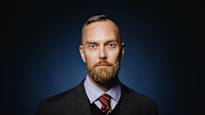Two years ago, Russia had to lose the war, now the same part is being offered to Ukraine. It’s time to wonder how we managed to talk about the war, Käihkö reflects.
Ilmari Kaishkö Docent of Military Sciences
At the turn of last year press corps Erkka Mikkola, Iida Tikka and Suvi Turtiainen are wondering whether we have been too optimistic about how the war in Ukraine is going. The short answer to the question is: Yes.
But an even more important question is why in Finland – with the exception of a few individual reflections – no broader interim account of the public debate about the war has been made. Why, for example, do we speak Ukrainian now? of lossalthough two years ago it was considered a loser Russia.
Learning from the past would be investment for the future. War and crises are unfortunately permanent phenomena. Reflecting on the successes and failures of their public handling can literally save lives sometime down the line.
Learning from the past would be an investment in the future.
I share the discussants who commented on the war into three groups: journalists, decision makers and experts. In this way, the groups have their own areas of responsibility: journalists inform, decision-makers decide and experts share their expertise.
My specialty is expertise. In that role, I have also constantly had to think about what helps, and on the other hand, what hinders, our understanding of war?
Why, for example, have Finnish historians not participated more in the discussion of the war in Ukraine?
Analyzes of the Ukrainian war in assessments it has been found, among other things, that the sameness of a small, introverted group of experts suppresses critical thinking. Similarity attracts for groupthink.
There is nothing wrong with consensus per se, but understanding a multidimensional phenomenon also requires disagreement peeing in exchange for. Other than military scientists are needed for the discussion.
I have pondered why, for example, distinguished Finnish historians have not participated more in the discussion about the war in Ukraine. Especially when many phenomena familiar from Finland’s past seem to repeat themselves in the war.
I asked a historian about it. The answer was confusingly simple: no one had asked. So here comes a call to journalists acting as gatekeepers of the public debate: ask!
In the discussion, the emphasis is always on Russia’s thinking at the expense of Ukraine.
The decision-makers should, in turn a reason to strengthen our still weak expertise in Ukraine – especially if Ukraine really is a priority of our foreign and security policy. Now the emphasis is all the time in the conversation Russian reflection at the expense of Ukraine.
One important factor is related to spaces and platforms of discussion. Discussions about the war continue to take place mainly in the news media. Its interest is mainly in the latest events of the war – deeper, and usually slower, as well more boring instead of analysis.
The discussion about the war would therefore also need new forums. Finding such, however, is hampered by the fact that everything related to security is sensitively hidden in Finland. The few publications also indicate that scientific research on the war is valued in a small way.
International ones examples showthat it is possible to learn about wars without hiding the doctrines. Open discussion is essential for science. It also encourages development.
In Finland, our understanding is blurred so is the mixing of commentators’ roles. It is noteworthy that a significant number of Finnish war commentators have been either authorities or politicians.
It is worth asking, does self-censorship increase if what is said can be interpreted as the official line of the state?
Well – on the other hand, there has also been concern that some experts are serving up populist messages about the war to pleaseeven to entertain, their social media followers.
Both concerns may be partly true. It is at least easy for populism to flourish in the soil of uncertainty and worry that is always associated with war.
Every commentator makes mistakes sooner or later. I myself started them right at the beginning of the war.
I have commented in progress the ongoing war practically constantly, – and equally constantly I also wonder how we experts succeed in our predictions? The honest answer is: it varies.
Every war commentator makes mistakes sooner or later. I myself started them right at the beginning of the war by misjudging the performance of the Ukrainian army in relation to the Russian invasion forces. The most important thing is not to avoid mistakes, but to learn from them together.
A careful analysis of the war, and with it a deeper understanding of the war, serves above all the decision makers. Although a truthful analysis that challenges exaggeration and easy wisdom only affects, if decision-makers also act accordingly.
Ilmari Käihkö
The author is a self-critical military scientist who gratefully accepts factual feedback on his own analyzes of the Ukrainian war to the address [email protected]
The future event Aurora’s theme this year is safety. Follow the discussions at Areena on Wednesday, November 20.
